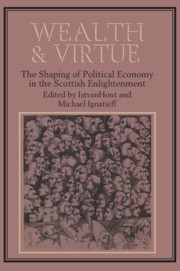Book contents
- Frontmatter
- Contents
- Preface
- List of abbreviations
- 1 Needs and justice in the Wealth of Nations: an introductory essay
- 2 Where had the Scottish economy got to by the third quarter of the eighteenth century?
- 3 Gershom Carmichael and the natural jurisprudence tradition in eighteenth-century Scotland
- 4 The Scottish professoriate and the polite academy, 1720–46
- 5 From applied theology to social analysis: the break between John Locke and the Scottish Enlightenment
- 6 The Scottish Enlightenment at the limits of the civic tradition
- 7 Adam Smith as civic moralist
- 8 The legal needs of a commercial society: the jurisprudence of Lord Kames
- 9 Cambridge paradigms and Scotch philosophers: a study of the relations between the civic humanist and the civil jurisprudential interpretation of eighteenth-century social thought
- 10 Adam Smith's ‘enduring particular result’: a political and cosmopolitan perspective
- 11 The ‘rich country–poor country’ debate in Scottish classical political economy
- 12 John Millar and individualism
- 13 Scottish echoes in eighteenth-century Italy
- Index
8 - The legal needs of a commercial society: the jurisprudence of Lord Kames
Published online by Cambridge University Press: 05 June 2012
- Frontmatter
- Contents
- Preface
- List of abbreviations
- 1 Needs and justice in the Wealth of Nations: an introductory essay
- 2 Where had the Scottish economy got to by the third quarter of the eighteenth century?
- 3 Gershom Carmichael and the natural jurisprudence tradition in eighteenth-century Scotland
- 4 The Scottish professoriate and the polite academy, 1720–46
- 5 From applied theology to social analysis: the break between John Locke and the Scottish Enlightenment
- 6 The Scottish Enlightenment at the limits of the civic tradition
- 7 Adam Smith as civic moralist
- 8 The legal needs of a commercial society: the jurisprudence of Lord Kames
- 9 Cambridge paradigms and Scotch philosophers: a study of the relations between the civic humanist and the civil jurisprudential interpretation of eighteenth-century social thought
- 10 Adam Smith's ‘enduring particular result’: a political and cosmopolitan perspective
- 11 The ‘rich country–poor country’ debate in Scottish classical political economy
- 12 John Millar and individualism
- 13 Scottish echoes in eighteenth-century Italy
- Index
Summary
Even in his own lifetime, Lord Kames often appeared to have earned greater distinction as a patron and publicist for the Enlightenment in Scotland than as one of its leading philosophical spokesmen. ‘He did more to promote the interests of belles lettres and philosophy in Scotland than all the men of law had done for a century before’, reported John Ramsay of Ochtertyre; and this achievement alone entitled him to a ‘distinguished place’ in any review of Scottish letters during the period. Kames's own literary output was of course prodigious, both in size and range of subject matter, spanning a publication period of over fifty years and comprising nearly half as many volumes. Yet even in his most impressive works, the philosopher–judge rarely achieved the concentrated philosophical depth of Hume or Smith, or the stylistic grace of Robertson. It is perhaps indicative of the general character of his publications that only the Elements of Criticism, the study of aesthetics for which Kames received greatest contemporary acclaim, has managed to sustain critical scrutiny for its theoretical merits; while the rest of his corpus has generally attracted more loosely historical consideration, as a representative product of that aggressive cultivation of the intellect which we have come to term the Scottish Enlightenment.
This study examines Kames's legal thought, particularly as developed in his Historical Law Tracts and Principles of Equity. Both works stem from the most dramatic period of Kames's long and active public career, the years circumscribed by the 1751 publication of the Essays on the Principles of Morals and Natural Religion and the appearance in 1762 of the Elements of Criticism.
- Type
- Chapter
- Information
- Wealth and VirtueThe Shaping of Political Economy in the Scottish Enlightenment, pp. 203 - 234Publisher: Cambridge University PressPrint publication year: 1983
- 6
- Cited by

